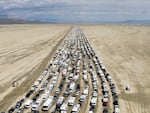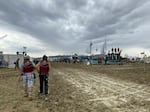
Vehicles seen departing the Burning Man festival in Black Rock City, Nev., on Monday.
Matt Mills McKnight / Reuters
Organizers of the annual Burning Man music and arts festival lifted a driving ban on Monday afternoon as muddy roads that had stranded thousands of attendees in the Nevada desert had dried up enough to allow people to begin leaving.
"Exodus operations have officially begun in Black Rock City," organizers posted Monday at 2 p.m. local time, about seven hours before the festival's fiery conclusion. The torching of a giant, faceless, man-shaped effigy was carried out Monday evening, after having been postponed twice due to the weather.
But as of Tuesday morning, the festival was asking participants to consider staying a little longer if they could. Traffic was so congested that it was taking drivers roughly seven hours to traverse a 5-mile route, pocked with puddles, to the nearest paved road.
And that was just the beginning of the journey home for the roughly 72,000 attendees who traveled to the festival's remote site in northern Nevada, about 120 miles north of Reno.
Even during normal years, exodus traffic jams can last for six to nine hours, according to the organizers. Cars, trucks and RVs stuffed with sleeping bags, stoves and tents all cram onto a single two-lane road leading to the nearest major highway.
But this year's participants had been stranded since Sunday, after storms turned the desert playa into a mud bath. Close to an inch of precipitation flooded the area starting on Friday, prompting event organizers to close access to the festival until vehicles could safely pass and to warn campers to conserve food and water.
Wet weather didn’t dampen the Burning Man spirit
Despite reports of stuck vehicles, overflowing port-a-potties, postponed bus pickups and spotty Wi-Fi service, several attendees who spoke to NPR say the wet weather hadn't dampened moods.
"We're pooling all our food as far as resources. And I would say honestly, walking around the city, spirits are pretty high," attendee Anya Kamenetz said on Sunday.
The challenging conditions are testing a community of so-called burners, which touts self-reliance and communal effort among its core principles.
Event volunteer Josh Lease said that in true Burning Man spirit, people were sharing warm clothes and phone chargers where they could — and they kept the music blaring.
"It's like any other Burning Man, just muddy," he told NPR on Saturday evening.
"The warnings do sound very dire, and of course, the organization has to tell people to take care," said Claudia Peschiutta, an editor with NPR's Morning Edition who attended the event, but "I haven't seen one person who seems worried about it at all."
Some frustration, however, started to seep in for some attendees by Sunday.
In rainy Burning Mans past, longtime burner Joe Bamberg said he's seen couches, carpets and clothes eventually dry out. But this time, he said, "all is damp and will be ruined by mold," he said.
"I am not thrilled," said Bamberg, who added: "People make do, it is part of the adventure."
Meanwhile, authorities in Nevada were investigating a death at the site. The Pershing County sheriff said on Saturday that a person was found dead on the playa but declined to offer any further details in an interview with CNN on Monday.
Some burners made the trek out on foot

Burning Man attendees walk through a muddy desert plain on Saturday, after heavy rains pelted the annual Nevada festival.
Julie Jammot / AFP via Getty Images
The Burning Man Organization had begun telling attendees to shelter in place on Saturday, when it announced that access into and out of the site was closed for the remainder of the event, which runs from Aug. 27 through Sep. 4. Only emergency vehicles were allowed to pass, the organization said in a statement.
"Conserve food, water, and fuel, and shelter in a warm, safe space," the statement urged those stuck in the desert.
Although they urged attendees against driving on Sunday, event officials said that some vehicles designed for off-road terrain had been able to navigate the mud and successfully leave the event.
Other attendees chose to walk several miles across the muck to exit the grounds.
Music producer Diplo said he and comedian Chris Rock escaped the event on Saturday after walking 6 miles before hitching a ride from a fan in a pickup truck.
"I legit walked the side of the road for hours with my thumb out cuz I have a show in dc tonight and didnt want to let yall down," he wrote in an Instagram post.
Neal Katyal, former acting Obama-era solicitor general, also made the trek out. He said he was safe after his first trip to the festival ended with "an incredibly harrowing 6-mile hike at midnight through heavy and slippery mud."
President Biden had been briefed on the situation, according to a White House official. Event attendees were told over the weekend to listen to state and local officials, and event organizers, the administration official said.
"We have come here knowing this is a place where we bring everything we need to survive," the organization said in a statement Saturday night. "It is because of this that we are all well-prepared for a weather event like this."
"We have done table-top drills for events like this. We are engaged full-time on all aspects of safety and looking ahead to our Exodus as our next priority."
More than 70,000 people visit the makeshift town of Black Rock City every year to dance, make art and join a self-sufficient, counter-cultural community.
The weeklong festival began in 1986 as a small gathering in San Francisco. Today, celebrities, tech moguls and social media influencers are common attendees. This year's ticket prices started at $575.
The weekend's events weren't the first time the entrance had been blocked at this year's festival. A group of climate protesters caused miles of gridlock at the start of the event by parking a 28-foot trailer in the way.
Copyright 2023 NPR. To see more, visit https://www.npr.org.